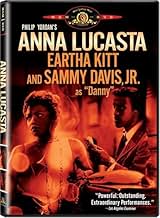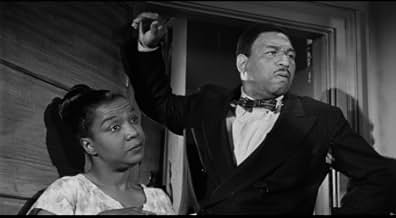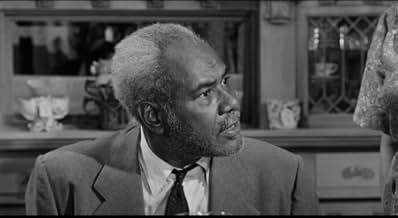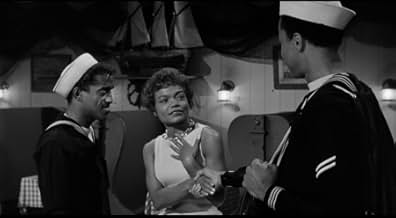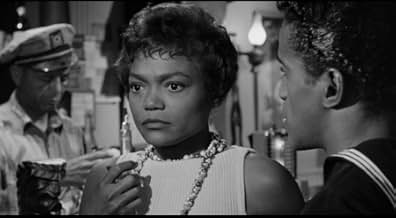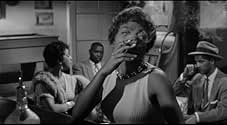Füge eine Handlung in deiner Sprache hinzuA young woman struggling with a sordid past finds that her biggest enemy had larger demons than she did.A young woman struggling with a sordid past finds that her biggest enemy had larger demons than she did.A young woman struggling with a sordid past finds that her biggest enemy had larger demons than she did.
Rosetta LeNoire
- Stella
- (as Rosetta Le Noire)
Wallace Earl Laven
- Secretary
- (as Eileen Harley)
Empfohlene Bewertungen
Eartha Kitt sizzles in this film about a tough young woman who we first meet in a San Diego bar, fending off unwanted advances by sticking a cigarette into a guy's neck. She's just scraping by, having been thrown out of her house by her father. We gradually get the idea she sells herself to sailors, one of whom is the fast-talking Sammy Davis Jr., who appears here in his first acting role. She's taken back home by her father for ulterior reasons, and meets an intelligent young college graduate (Henry Scott). Can she 'make good' with the young man, despite the shame of her past?
Kitt is fantastic, and plays scenes of defiance, anger, out of control partying, tenderness, vulnerability, and grief all very well. She's a delight to watch, as well as to listen to, with that fabulous, silky voice. Sammy Davis Jr. more than keeps up with her with snappy, hip dialog and a short dance scene that shows just how light on his feet he was. The script has plenty of innuendo, and Kitt's look when Scott asks her what she did down in San Diego is priceless. "I didn't go to college," she purrs. But my favorite line is when Davis Jr. says in an impassioned tone, "You and me, we're real people, Anna. We're the real stuff. Many's the time we set the Earth on fire. You stick with me and we'll burn it up!" It's a great scene with a lot of emotion, and he is marvelous in it.
The supporting actors in the cast are reasonably good as well. Rex Ingram plays her alcoholic father who would probably win the "worst father ever" award if it existed, and Frederick O'Neal is her opinionated brother-in-law who is also pretty hard to like, though both do fine jobs. Georgia Burke is the sweet mother who never loses faith in her daughter, and it's nice to hear her singing around the house. Aside from her singing and the nightclub music, however, the background music in the soundtrack is pretty mediocre.
The film does have a low-budget feel to it, and the quality of print that I saw was unfortunately much worse than others from this time period. For the most part it's pretty ordinary filmmaking, but I did notice some subtle things in the background of a couple of shots that were interesting. In one, as Anna wrestles with her sad past, assuming it won't be good enough for her new suitor, she stands in front of a photography store window which has pictures of smiling people, including a large one of a happy baby. In another, as she's with her father, trying to reconcile with him (which is a surprise given his past treatment), a stitchery hangs in the background saying "God is Love."
It was very refreshing to find that the film had no stereotypes. While it's a dysfunctional family straight out of Tennessee Williams and therefore a bit extreme, the script could have been performed by an all-white cast without a single change. I loved seeing Eartha Kitt and Sammy Davis Jr., especially Kitt, and it's no wonder Orson Welles called her "the most exciting woman in the world." She is as gorgeous as she is talented. There are a couple of moments in the plot that stretch credibility, and it gets a little melodramatic for sure, but it's also highly entertaining and deserves a higher average rating for the star power.
Kitt is fantastic, and plays scenes of defiance, anger, out of control partying, tenderness, vulnerability, and grief all very well. She's a delight to watch, as well as to listen to, with that fabulous, silky voice. Sammy Davis Jr. more than keeps up with her with snappy, hip dialog and a short dance scene that shows just how light on his feet he was. The script has plenty of innuendo, and Kitt's look when Scott asks her what she did down in San Diego is priceless. "I didn't go to college," she purrs. But my favorite line is when Davis Jr. says in an impassioned tone, "You and me, we're real people, Anna. We're the real stuff. Many's the time we set the Earth on fire. You stick with me and we'll burn it up!" It's a great scene with a lot of emotion, and he is marvelous in it.
The supporting actors in the cast are reasonably good as well. Rex Ingram plays her alcoholic father who would probably win the "worst father ever" award if it existed, and Frederick O'Neal is her opinionated brother-in-law who is also pretty hard to like, though both do fine jobs. Georgia Burke is the sweet mother who never loses faith in her daughter, and it's nice to hear her singing around the house. Aside from her singing and the nightclub music, however, the background music in the soundtrack is pretty mediocre.
The film does have a low-budget feel to it, and the quality of print that I saw was unfortunately much worse than others from this time period. For the most part it's pretty ordinary filmmaking, but I did notice some subtle things in the background of a couple of shots that were interesting. In one, as Anna wrestles with her sad past, assuming it won't be good enough for her new suitor, she stands in front of a photography store window which has pictures of smiling people, including a large one of a happy baby. In another, as she's with her father, trying to reconcile with him (which is a surprise given his past treatment), a stitchery hangs in the background saying "God is Love."
It was very refreshing to find that the film had no stereotypes. While it's a dysfunctional family straight out of Tennessee Williams and therefore a bit extreme, the script could have been performed by an all-white cast without a single change. I loved seeing Eartha Kitt and Sammy Davis Jr., especially Kitt, and it's no wonder Orson Welles called her "the most exciting woman in the world." She is as gorgeous as she is talented. There are a couple of moments in the plot that stretch credibility, and it gets a little melodramatic for sure, but it's also highly entertaining and deserves a higher average rating for the star power.
Meowwwww... Eartha Kitt, ten years before she was Catwoman on "Batman"! This film not only co-stars Sammy Davis Jr, but that's also him singing the "Anna" theme. Things are pretty rough for Anna as the film opens. She's been tossed out by her family, even to the point of not have a place to sleep. But... just as things might be turning around for her, she runs into her old sailor friend, Danny, (Sammy Davis) and his pal Lester. Anna isn't sure if she likes either one of her options... her old sailor buddy that doesn't want to get married, or the "friend of the family" that is staying in town looking for work. Rudolph is played by Henry Scott, and it looks like this film is the only thing he ever did. and just when things are finally looking up for Anna, more people are running interference against her. Based on a play by Philip Yordan. He had just won the oscar for Broken Lance. "Anna" was first done by a white cast (1949), then later done by a black cast (1958). This is quite good, and i'm glad that Turner Classics is showing it. and now that I've seen THIS version, of course i want to see the 1949 Paulette Goddard version too. Highly recommended, if you can catch it.
At the core of Anna Lucasta is a creaky plot that isn't seen often today -- the decent man who falls in love with the irresistible prostitute (see also The World of Susie Wong, Breakfast at Tiffany's, The Owl and the Pussycat, etc.). However, instead of focusing on the man's dilemma, Anna Lucasta focuses on the prostitute's family and friends. The screenplay is by a distinguished playwright and screenwriter, Philip Yordan, who based it on his own Broadway play, so it does have its moments -- an occasional good line, striking monologue, or clever exchange of dialogue. But it remains stagy, and the director's infrequent attempts to "open up" the play with cinematic devices don't work well.
However, the movie is valuable because it preserves performances by prominent black stage actors who for the most part rarely appeared on screen, certainly not in major, non-stereotypical roles. Nearly every actor and actress in the film is given a moment to shine, and they all acquit themselves well, with the possible exception of the great actor Rex Ingram, who sometimes chews the scenery as Anna's drunken and vengeful father. The beautiful Isabel Cooley, in a small role as Anna's sister, is a revelation here.
Eartha Kitt always plays Eartha, but her Anna more than adequately shows many facets -- on the edge of hard-bitten, but still yearning to be accepted as innocent and sweet, attracted to the fast life, but hurt and wounded and feeling unloved. And Sammy Davis' performance is much better than the reviews he received when the movie was released or on IMDb. He plays Anna's other suitor, who loves her in his own fashion, but who wants her as a companion for good times and partying, not as a wife. He's shallow, but he has a core of decency and concern for Anna, and Davis portrays both sides well. (Think of Sammy as Sportin' Life in Porgy and Bess, whom he would portray in the same year, but with depth.)
However, the movie is valuable because it preserves performances by prominent black stage actors who for the most part rarely appeared on screen, certainly not in major, non-stereotypical roles. Nearly every actor and actress in the film is given a moment to shine, and they all acquit themselves well, with the possible exception of the great actor Rex Ingram, who sometimes chews the scenery as Anna's drunken and vengeful father. The beautiful Isabel Cooley, in a small role as Anna's sister, is a revelation here.
Eartha Kitt always plays Eartha, but her Anna more than adequately shows many facets -- on the edge of hard-bitten, but still yearning to be accepted as innocent and sweet, attracted to the fast life, but hurt and wounded and feeling unloved. And Sammy Davis' performance is much better than the reviews he received when the movie was released or on IMDb. He plays Anna's other suitor, who loves her in his own fashion, but who wants her as a companion for good times and partying, not as a wife. He's shallow, but he has a core of decency and concern for Anna, and Davis portrays both sides well. (Think of Sammy as Sportin' Life in Porgy and Bess, whom he would portray in the same year, but with depth.)
I can see why Eartha Kitt has always been a gay icon and why her legion of gay fans - black and white - kept her working during the twilight years of her extremely long career in show business. She's campy, witty, sexy, and vulnerable...and a very funny funny girl with a very sharp tongue especially when she delivers her trademark rapid-fire one-liners in the opening barroom scene. Her grand entrance is over-the-top and her timing perfect. In a perfect world Kitt would have been right up there with Marilyn Monroe, Barbra Streisand, Elizabeth Taylor, Joan Crawford and Rita Hayworth...BUT she was BLACK...and Hollywood has had few decent leading roles for black actresses like Kitt, Dandridge, Horne...or even Halle. The black family in this movie is captured with humor and dignity by a sterling cast of black actors hungry for work other than playing maids, butlers, African natives, and southern slaves. "Anna Lucasta" is a Black Classic.
When Sammy Davis Jr and Eattha Kitt act together it's dynamite and a feast for the professional cinéaste. But they are not alone. Equally prominent is Rex Ingram as the father in a completely wayward character that can't control himself, disoriented in life, lost in booze, all mixed up because of his beloved daughter, that he felt he had to banish from his life forever, without succeeding - he is the one who begs her to come back. This is a great play enacted with grim intensity and empathy concerning all the characters, including the mother, the suitor, the family and even the lower people at the joint. An important part is played by Elmer Bernstein's music, ingeniously illustrating the rapidly changing moods and trains of thoughts, also including a fabulous show scene with Sammy going solo - this is actually the apex of the film and story, a spectacular visualization of Anna's downfall and helplessness in the hands of the totally irresponsible Danny, who loves her none the less, but like everybody else, not even he can control his love or his feelings but drifts to the storms of his caprices. In fact, Anna, the fallen woman, adored and despised by them all, is the only one with a character, while the others are hopelessly and helplessly without. But what fabulous acting by these three main characters! This is truly a film to enjoy for a theater and drama gourmet. 9,5 would be my vote.
Wusstest du schon
- WissenswertesOriginally a play written by Philip Yordan, portraying a Polish-American family, the play was rewritten by American Negro Theater Director Abram Hill and director Henry Wagstaff Gribble for an all African-American cast.
- PatzerWhen Joe dies, his head drops to the right. When shown from another angle, he is facing left.
- VerbindungenVersion of Anna Lucasta (1949)
Top-Auswahl
Melde dich zum Bewerten an und greife auf die Watchlist für personalisierte Empfehlungen zu.
- How long is Anna Lucasta?Powered by Alexa
Details
- Erscheinungsdatum
- Herkunftsland
- Sprache
- Auch bekannt als
- Anna Lucasta - gatflickan
- Drehorte
- Produktionsfirma
- Weitere beteiligte Unternehmen bei IMDbPro anzeigen
- Laufzeit1 Stunde 37 Minuten
- Farbe
- Seitenverhältnis
- 1.66 : 1
Zu dieser Seite beitragen
Bearbeitung vorschlagen oder fehlenden Inhalt hinzufügen



